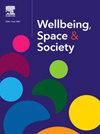Walking as socio-material micro-structures for new parents: Slow mobilities, puddles and the everyday
IF 2.2
Q2 GEOGRAPHY
引用次数: 0
Abstract
New parenthood is a time of change and upheaval in which a reorientation in/to/with place occurs. Local mobility poses a promising avenue of inquiry with potential to articulate place-based parent-centred health promotion strategies. We aimed to explore the affective, sensory and socio-material encounters of new parents on their walks in their local neighbourhoods, and their role in health and wellbeing. Through walking and photo-elicitation interviews with 22 parents of young children in Aotearoa New Zealand, we experienced diverse relationalities with their local neighbourhoods. Our inquiry taught us that parents use local walking as a tool in a range of different ways that impacts their health and wellbeing. We learnt that parents encounter (1) more-than-green-spaces in their walks, and that even small, not-noticeable and mundane aspects of the neighbourhood can affectively coagulate with parent-baby-walking-assemblages. In encountering how walks (2) nourished-minds-and-bodies we learnt the varied ways in which walking was a tool for affective release, emotion regulation and physical activity. Lastly, walking provided (3) unstructured-wandering-time for parents that slowed down, enmeshed, and transversed time. Our findings suggest that further inquiry into the health-promoting capacity of parental mobility in sub/urban neighbourhoods is promising. We propose that learning about the relationalities of socio-material micro-structures in parent-baby-assemblages can create localised health-promotion opportunities for new parents. We seek to raise the visibility of everyday place-based parental needs to inform policy and systems change.

走路作为新父母的社会物质微观结构:缓慢的移动,水坑和日常
初为父母是一个变化和剧变的时期,在这个时期,人们会重新定位自己的位置。地方流动性提供了一个有希望的调查途径,有可能阐明以地方为基础的以父母为中心的健康促进战略。我们的目的是探索新父母在当地社区散步时的情感、感官和社会物质接触,以及他们在健康和幸福中的作用。通过对新西兰奥特罗阿22位幼儿父母的步行和拍照采访,我们体验了他们与当地社区的不同关系。我们的调查告诉我们,父母把在当地散步作为一种工具,以各种不同的方式影响他们的健康和幸福。我们了解到,父母在散步时遇到的不仅仅是绿色空间,即使是很小的、不引人注目的、平凡的邻里环境也能有效地与父母-婴儿散步的组合结合在一起。在了解散步如何滋养心灵和身体的过程中,我们了解了散步作为情感释放、情绪调节和身体活动的工具的各种方式。最后,步行为父母提供了(3)非结构化的漫游时间,使时间放慢、纠缠和跨越。我们的研究结果表明,对郊区/城市社区父母流动促进健康能力的进一步调查是有希望的。我们建议,了解父母-婴儿组合中社会-物质微观结构的关系可以为新父母创造局部健康促进机会。我们力求提高家长日常在地需求的可见度,为政策和制度变革提供信息。
本文章由计算机程序翻译,如有差异,请以英文原文为准。
求助全文
约1分钟内获得全文
求助全文
来源期刊

Wellbeing Space and Society
Social Sciences-Social Sciences (miscellaneous)
CiteScore
2.70
自引率
0.00%
发文量
46
审稿时长
124 days
 求助内容:
求助内容: 应助结果提醒方式:
应助结果提醒方式:


